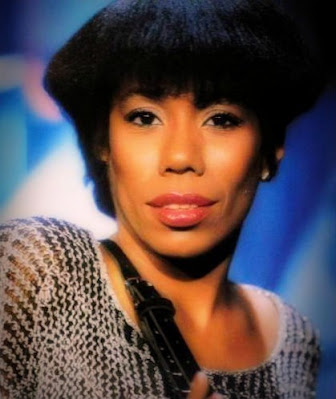Sharon Redd (October 19, 1945 – May 1, 1992) was an American singer from New York City. She was the half sister of R&B singer Penny Ford.
Sharon Redd was born in Norfolk, Virginia, to Gene and Katherine Redd. Gene Redd was a producer and musical director at King Records, and her stepfather performed with Benny Goodman's orchestra. Her brother Gene Redd Jr. was a songwriter and producer for Kool & the Gang and the band BMP. Her half-sister Penny Ford is also a singer with two solo albums to her credit and known for her work as the main singer for Snap!, Soul II Soul, and the S.O.S. Band.
She began her recording career with four singles in 1968 for the United Artists label, three written and all four produced by songwriter and record producer Bobby Susser. Susser chose the Hank Williams song "Half as Much" to be Redd's first single. Redd's vocals, against Susser's heavy-bass track, made her presence very quickly known to R&B radio stations. Redd, as a budding actress, got a major break when she starred in an Australian production of the rock musical Hair. She was among a troupe of young African American imports to the Sydney production, a group which notably included Marcia Hines. Redd appeared in the production from its June 6, 1969, premiere through 1971.
As Redd was becoming famous in Australia, she was interviewed by Barry Sloane on a 1971 episode of GTK. Her popular adverts for Amoco led to her own television special. Redd and Hair co-star Teddy Williams were asked to leave Australia by the Immigration Department in April 1971 for reasons they believed were race-motivated. Aside from Hair, Redd also appeared in Ti-Jean and His Brothers and, in 1974, traveled to London to star in an American production of The Wedding of Iphigenia. In 1977 Redd played the role of Sherrye in the U.S. sitcom television series Rhoda. 1978 also saw Redd feature as a guest in the musical Sgt. Pepper's Lonely Hearts Club Band. After this, she gained more exposure through a popular advertising campaign for Shaffer Beer.
In the mid-1970s, Bette Midler was looking to replace Merle Miller and Gail Kantor, both of whom had left after Midler's 1973 tour to pursue their own interests. Midler auditioned over 70 performers, but Redd landed the job, becoming one of Bette's Harlettes.
 |
| Redd with Midler |
Aside from performing as a
Harlette, Redd also provided backing vocals for Carol Douglas
("Burnin'" and "Night Fever") and Norman Connors ("You
Are My Starship"). Having ended their association with Midler, Redd,
Charlotte Crossley, & Ula Hedwig released an LP, Formerly of the Harlettes,
in late 1977. In 1978, RCA Victor released "Love Insurance" on a
12" disco as Front Page w/ Sharon Redd. She was credited on that version.
In 1979, Redd recorded the disco hit "Love Insurance", released by Panorama Records under the name Front Page, her own vocals going uncredited. But she soon signed a recording contract with Prelude Records, and Redd became the label's most successful artist.
Her debut studio album, 1980's self-titled Sharon Redd, was closely followed by two more—Redd Hott (1982) and Love How You Feel (1983). Though none of her singles had a huge impact on the R&B charts, the story was much different in clubs, where "Can You Handle It," "Never Give You Up," "Beat the Street," and "Love How You Feel" -- just to name a few -- were spun with great frequency.
After these releases, Redd returned to her successful career as a backing vocalist, most notably with the group Soirée, which also included among its members Luther Vandross and Jocelyn Brown. Following the UK Top 20 success of a re-recorded "Can You Handle It" by DNA, she recorded a single entitled "All the Way to Love", with Les Adams. The song remains unreleased. This was to be her last solo recording.
In the midst of mounting a comeback in the early 1990s, Redd died of pneumonia on May 1, 1992 in Westchester County, New York. Dance Music Report magazine reported that her death was AIDS-related. The virus had weakened her immune system, which had become ineffective following the singer stepping on broken glass on stage. Unidisc kept her albums in print in CD format, and a couple anthologies have also kept her material in circulation.
(Edited from Wikipedia & AllMusic)








2 comments:
For ”Sharon Redd – Essential Dancefloor Artists” Volume 3 (1994 Deepbeats) go here:
https://mega.nz/file/c7oVgADa#scSiGpNnoPumXlGDvTICr5SVihA9R-XO6skQJn1gak8
1. Can You Handle It (Original 12" Mix) 6:24
2. Try My Love On For Size (Original Full Album Version) 5:05
3. Love Is Gonna Get Ya (Original Full Album Version) 4:56
4. You Got My Love (Original Full Album Version) 5:52
5. Leaving You Is Easier Said Than Done (Original Full Album Version) 3:52
6. Takin' A Chance On Love (Original 12" Club Mix) 5:02
7. In The Name Of Love (Original 12" Club Mix) 6:30
8. You're A Winner (Original 12" Club Mix) 6:40
9. Beat The Street (Original 12" Club Mix) 5:58
10. Love How You Feel (Original 12" Club Mix) 7:03
11. Never Give You Up (Original 12" Club Mix) 7:00
12. Can You Handle It (Original 12" Club Mix) 8:57
A big thank you to Matlo44 @ Funkytown Eklablog for the loan of this CD
Si, estamos preparados para el baile. Muchas gracias.
Post a Comment